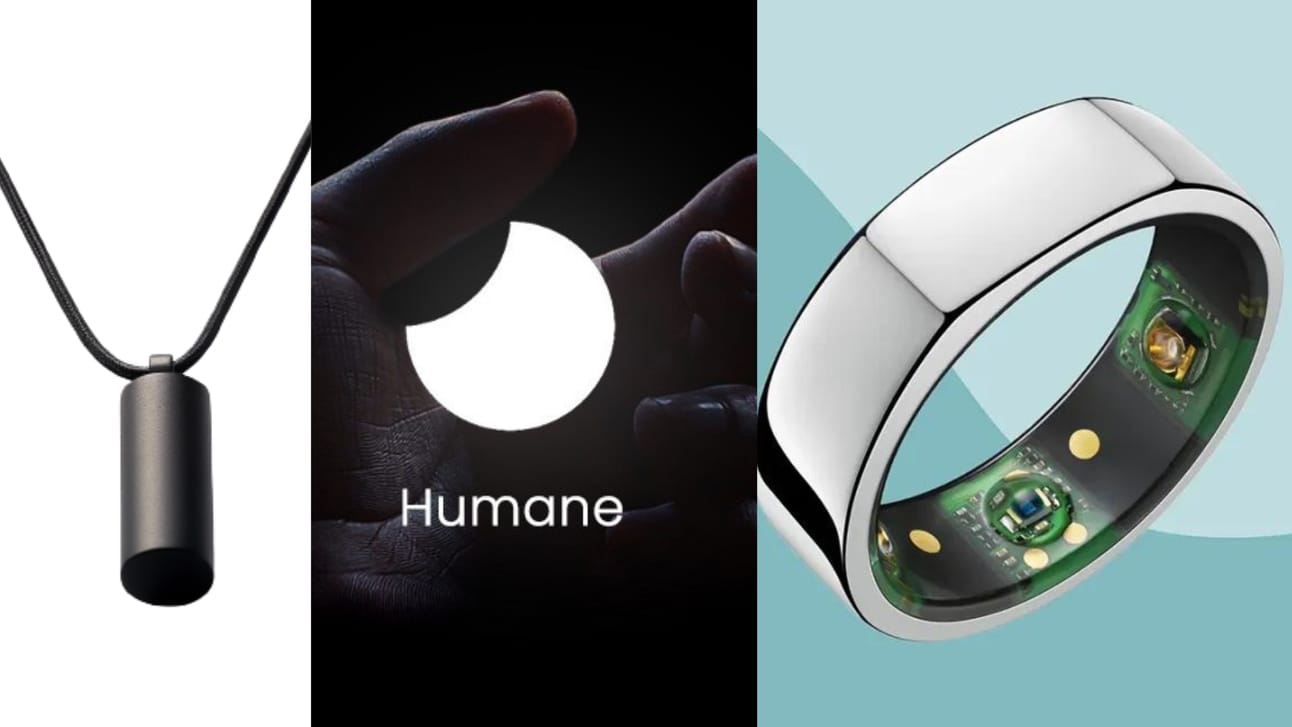Hey {{First name|there}}! It’s Aaron.
When was the last time you heard someone warned about the TV rotting your brain?
Your mum. Probably.
Well, here we are in 2025, and it’s not the TV that’s the culprit—it’s AI wearables.
Devices that promise to make our lives easier but could be quietly switching our brains to autopilot.

As these AI wearables become our constant companions, are we witnessing the dawn of superhuman productivity or programming ourselves for a mental meltdown?
Find out in today's issue of the Big Byte.
📌TL;DR
AI wearables are here, promising game-changing productivity and seamless multitasking.
But at what cost? Over-reliance risks turning our brains to autopilot, weakening memory and critical thinking.
The balance matters. These tools can enhance creativity, but dependency might erode our humanity.
More AI news…
Estimated reading time: 5 - 6 minutes.

CATCH OF THE DAY
Shortcut to Genius or Creativity Killer?
Wearable AI is no longer just for the Sheldons of the world… basically the ones who’d proudly show off their new gadget while explaining quantum mechanics to anyone within earshot.
These devices are stepping out of the niche and into the mainstream.

Source: Humane News
Tools like the Humane AI Pin, Meta’s Smart Glasses, and Omi promise convenience at our fingertips—or temples.
They can take notes, project presentations onto your hand, and even translate languages in real time.
But what’s the cost of outsourcing so much mental effort to these devices?
Are they augmenting our abilities or quietly eroding them?
The Case for Wearables
AI wearables are undeniably impressive.
The Humane AI Pin can translate on the fly and provide a screenless AI assistant for $699.
Meta’s Smart Glasses let you use voice commands to manage apps like Instagram and Bing, all while looking like a regular pair of Wayfarers.
And Omi, priced at $89, promises early brain-interface features with continuous listening for contextual information.
These tools are designed to increase efficiency and multitasking abilities.
For creators, these devices are tempting.
Imagine brainstorming a pitch while your AI wearable transcribes ideas in real time.
Or editing videos while walking your dog.
For professionals, the potential to boost productivity and manage workflows is huge.

Source: NFTevening
I get the appeal… anything that saves time is hard to ignore.
But here’s the catch: the more we rely on these devices, the less we engage with the world around us.
They could free us to focus on higher-level tasks, sure, but could they also lead us to outsource critical thinking entirely?
It’s like going to the gym but letting the machine do all the lifting.
Sure, you save effort, but are you getting stronger, or are you just going through the motions?
The Cognitive Cost
While these capabilities sound like a creator's dream, there's a whisper of concern that keeps me up at night.
Just as our muscles atrophy without regular exercise, what happens to our mental fitness when AI does all the heavy lifting?
Science has already started waving red flags.
A 2017 study of London cabbies showed that those who navigated using sight had more active hippocampi than their GPS-reliant peers.
By 2020, research revealed habitual GPS use caused a decline in spatial memory.
In simpler terms, the brain is a muscle… you either use it, or you lose it.
Wearables could follow the same pattern.
Constantly relying on AI for directions, reminders, and even conversations might make our brains lazy.
The hippocampus might just go on vacation while AI takes the wheel.
Remember Pixar’s Wall-E?
Humans became so reliant on their robots that they lost all mobility and independence, floating around on hoverchairs while machines did the thinking, moving, and heavy lifting.

Sure, it was funny—and a little terrifying—but is that where we’re headed?
If our AI wearables handle every mental workout, what happens when they’re offline, broken, or outdated?
Will we be left cognitively stranded, unable to navigate even the simplest challenges?
The dependency doesn’t stop at cognitive function. Over-reliance on AI as a singular source of truth has its dangers.
What happens when the device malfunctions or feeds us incorrect or biased information?
As we trust these tools more, we risk losing our ability to critically evaluate facts.
It’s not just about convenience anymore; it’s about maintaining the mental resilience to question what we’re being told.
The Social Shift
Always-on listening devices like Omi raise valid concerns about privacy.
Sure, they promise not to record without consent, but how do you ensure that when everything is connected and always "on"?
For those naturally skeptical of surveillance, these tools could feel more invasive than helpful.
Interestingly, we’ve adapted to major shifts before. Think back to the pandemic when masks became the norm.
We learned to read emotions through eyes alone.
Could AI wearables force us to evolve again, finding new ways to communicate amid all the screens and sensors?
Maybe.
But will we lose the richness of unmediated human interaction along the way?
I imagine a future where everyone walks around talking to their glasses or necklaces, immersed in their own virtual worlds.
It’s convenient, but is it isolating?
Will these tools connect us, or will they push us further apart by replacing genuine interaction with AI-enhanced multitasking?
The Final Byte
Wearable AI is both a blessing and a curse.
It can make us more efficient and unlock new levels of creativity, but it also comes with significant risks… cognitive laziness, dependency, and an erosion of critical thinking.
We must ask ourselves: What are we gaining, and what are we losing?
As creators and innovators, we need to embrace AI thoughtfully.
These tools can enhance our lives, but only if we maintain the balance.
AI wearables should be just that.
Tools, NOT crutches.
So the next time you’re tempted to let your AI pin take over, remember… sometimes, the best workout for your brain is to let it do the heavy lifting.
See you in the next one,


A MESSAGE FROM GAMMA
An entirely new way to present ideas

Gamma’s AI creates beautiful presentations, websites, and more. No design or coding skills required. Try it free today.
BYTE-SIZED BUZZ
Here’s a quick roundup of what’s making waves in the AI world this week.
AI Is Changing the World for the Better 🌍
From precision healthcare to water-cleaning bots, AI is tackling major global challenges.
NVIDIA is spearheading efforts to speed up cancer research, clean up polluted waters, and empower developers in Africa.
The Big Deal: AI isn’t just about automation—it amplifies human creativity to solve problems that matter.
Virtual Employees Are Coming Sooner Than You Think 🤖
OpenAI’s new AI agent, “Operator,” could soon book meetings, write code, and handle workflows autonomously.
Microsoft and McKinsey are already deploying similar tools.
The Big Deal: These virtual employees might free up time for creators to focus on strategy—or disrupt workflows entirely. The future of work is closer than you think.
OpenAI’s Safety vs Speed Debate 🚀
Sam Altman predicts superintelligence could be here in a few years, sparking criticism over OpenAI’s profit-driven focus and lack of safety guarantees.
The Big Deal: This raises critical questions about how fast we’re advancing AI and whether we’re prioritizing ethics over growth.
Google’s ‘Daily Listen’: AI-Powered Podcasts 🎧
Imagine personalized, five-minute AI-generated podcasts tailored to your search habits.
Google’s latest experiment aims to reshape content consumption for auditory learners.
The Big Deal: Quick, engaging content like this could redefine how creators connect with audiences, making information accessible and relevant.
Babel OS: Breaking Language Barriers 🌐
Timekettle’s AI-powered earbuds now deliver real-time translations in over 40 languages with natural tone and customizable lexicons.
The Big Deal: This is a game-changer for creators, educators, and businesses needing seamless global communication.
SUGGESTION BOX
What'd you think of this email?

BEFORE YOU GO
I hope you found value in today’s read. If you enjoy the content and want to support me, consider checking out today’s sponsor or buy me a coffee. It helps me keep creating great content for you.
New to AI?
Kickstart your journey with…
ICYMI
Check out my previous posts here



